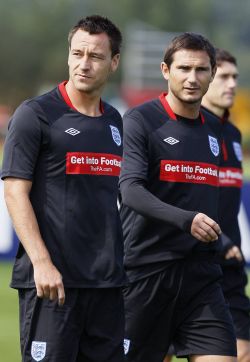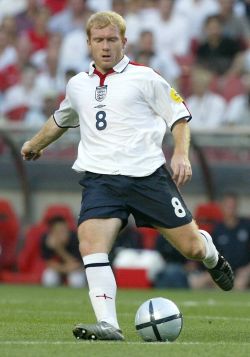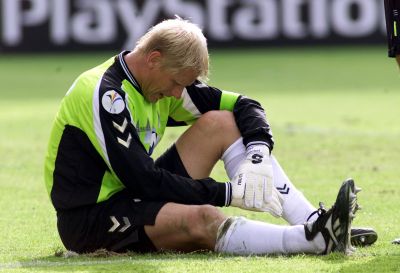IT WAS inevitable that last Sunday’s FA Community Shield match between Manchester United and Chelsea would be England fans’ first chance at booing their flopping FIFA World Cup 2010 stars.
With England players like Wayne Rooney, Frank Lampard, John Terry and Ashley Cole making their first official club appearances on Sunday since their South African misadventure, all those at Wembley Stadium finally had a chance to voice their disapproval at the national team’s dismal World Cup campaign.
There was a visible red and blue divide in the stadium, and every touch by Rooney would see the blue end ring out in anger, while Terry and Cole drew an equal, if not stronger, reaction from the red corner every time they were called into action.
Lampard, rightfully, was spared much of the vitriol, since he did have some half-decent performances in South Africa and had that perfectly fine goal disallowed against Germany.

Terry and Lampard training ahead of England's friendly against Hungary. Lamps was spared most of the booing during the Community Shield days before the friendly, but Terry got quite an earful every time he got near the ball.
But by the end of the match, which ended 3-1 in United’s favour (with United new-boy Javier Hernandez scoring in the second half to put his team 2-0 up), most of the detractors had been well and truly silenced.
Rooney, the most shockingly poor player in South Africa by his own high standards, looked like a completely different player, or more like the player we all knew he was, and it was his run and cross behind the Chelsea defense that set-up a brilliant opening goal for Antonio Valencia.
Cole, too, was the constant destructive presence down the left flank he usually is for Chelsea, though the boos directed at him had probably less to do with his footballing performances than his personal character.
Lampard also played so much better than in South Africa; though he wasn’t spectacular.
So the questions remains: how on Earth did these players become absolute rubbish in the three weeks in South Africa?
Some would say that manager Fabio Capello’s strict regime had curbed Rooney’s natural enthusiasm for the game; Lampard was used to have the team built around his talent at Chelsea instead of having to accommodate players like Steven Gerrard with England; and Cole was busy enjoying life as a soon-to-be divorcee. Unfortunately, no amount of guessing will ever provide a conclusive answer.
Nevertheless, the most over-glorified friendly match in football was for once, a telling event in that it showed the huge gap between the England players’ club and country form that Capello needs to bridge.
Another telling point was in how United midfielder Paul Scholes more than stood his ground against Lampard and Michael Essien even at the age of 35.
Scholes belongs to an older generation of English footballers similar to Barcelona’s current batch of Spanish stars. When he played for England, there was always a nucleus of United players alongside him, be it David Beckham, Gary Neville, Phil Neville, Nicky Butt or even occassionally, Teddy Sheringham and Andy Cole. And they always knew how to play as a team.
The latest “Golden Generation” of English football that Capello inherited is far from that united group. They are players from an assortment of clubs, all with very distinct styles of football.
But even on his own last weekend, Scholes was in vintage form, a term increasingly often applied to the midfield maestro, and Capello would surely have been cursing himself for not giving him more than two hours to decide if he wanted in on the World Cup squad.
The ginger-haired assassin glued United together much like the way Xavi does for Spain with simple passing and an innate ability to understand space on a football pitch; all the while possessing a creativity and range of passing that could unlock the opposition at any time.
It was his lofted pass that sent Rooney on his way to carving out the goal for Valencia, and his earlier scooped pass over the Chelsea back four, also to Rooney, was equally brilliant. Though it’s still anyone’s guess if he could’ve made a difference in South Africa, his performance showcased the exact abilities that England were lacking.
There was, however, one glaring point from the Community Shield that Capello will have to address – the seemingly terminal decline of John Terry.
The only player who failed to silence his detractors on the pitch was England’s disgraced former captain, whose lack of pace was so cruelly exploited by Scholes’ pass to Rooney for that opening goal.
Big, aggressive defenders like Terry have a short lifespan in top flight football these days. Just ask Sol Campbell, if you can get an honest answer out of him.
They are used to dominating, used to winning every header and getting ahead of every player. But as Peter Schmeichel said when he retired, it’s harder for the big guys to stay in shape. For a defender, that means you’ll be missing a header once in a while, or get turned by a younger, faster forward on and off – something you cannot afford in top flight football.
Terry is now losing that extra strength and yard of pace that made him such a force for Chelsea all these years. If his ill-advised coup attempt wasn’t enough to keep him out of the England first XI, then his form surely should.
Then again, like Rooney, Lampard, Cole and the other England players, he might just go ahead and have a stellar season for Chelsea, though it seems more likely that they would collapse for England again. If that happens, then this year’s Community Shield would in hindsight be even more telling than ever.




Tell us what you think!